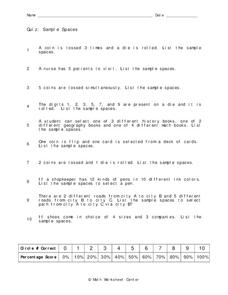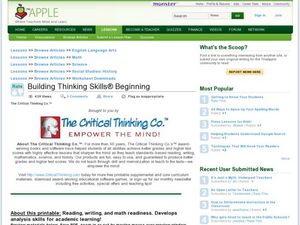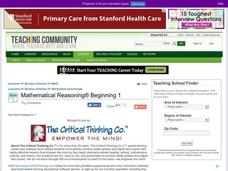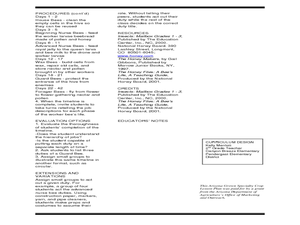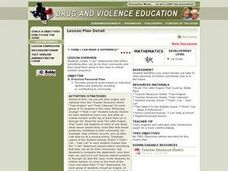Curated OER
Lesson 3: Measuring Angles
Students use a protractor to measure angles. They classify angles by type: right angle, acute angles, and obtuse angles. Students build and draw right, acute, and obtuse angles. They discuss how do people in various professions use...
Curated OER
You've Got Mail
First graders study the postal system and letter writing. They exchange class letters with another class in a different area and become pen pals with residents in a local nursing home.
BioEd Online
Bone Structure: Hollow vs. Solid
What is meant by the phrase "form follows function?" Allow your budding biologists to discover first-hand through two activities. In the first, groups work together to discover whether a solid cylinder or an empty cylinder can support...
Baylor College
Calculating Exponential Growth
There can be a steep learning curve when teaching about exponential growth, but the lesson helps kids make sense out of the concept. When talking about exponential growth of viruses, learners may not be very interested, but when you are...
Curated OER
The Family Tree
In this patterns practice instructional activity, students read a 3-paragraph excerpt regarding a family tree and respond to 1 graphic organizer question and 1 short answer question.
Curated OER
Apple Estimation: Percentages & Subjective Reasoning
Students practice using their estimation skills by utilizing apples. In this percentage lesson, students utilize a scale and an apple to discover the percentage of each bite they take. Students share their data with the rest...
Curated OER
Tasty Mapping
Students create an edible map. In this civics and geography activity, students research their town's features and local government. Students work in groups to design and create a physical map of their town based on research.
Curated OER
Counting Principle
In this counting principle worksheet, students solve 10 problems by applying the counting principle to each one. First, they determine the number of possible outcomes in a coin toss. Then, students the number of different cards with the...
Curated OER
Sample Spaces
In this sample spaces worksheet, 9th graders solve 10 different word problems that include sample spaces in each. First, they toss a coin and roll a die listing the sample spaces for each. Then, students flip one coin and select a card...
Curated OER
Tree Diagrams
In this tree diagram worksheet, students read story problems. From the given information, they draw tree diagrams to determine the total possible number of outcomes. This one-page worksheet contains ten problems.
Curated OER
Thinking Skills: Connecting shapes
In this thinking skills activity, students draw a line connecting each blue figure without touching any other color. Students connect 4 figures.
Curated OER
My Teeny Tiny Book (Counting to Ten in Different Languages)
In this counting to ten mini book, students cut out and color a book that shows the numbers from 1-10 and the words for the numbers. The languages in this book are: English, Spanish, French, Swedish, Japanese and Swahili. Pronunciation...
Curated OER
Junie B.'s Band-Sid Shapes
In this Junie B. Jones activity learning exercise, students identify the 8 band-aid shapes pictured on the sheet and then color each of them.
Curated OER
Money Management-Grocery Shopping for a Family Profile
Students investigate a family profile and design a menu plan. In this consumer science lesson, students plan and prepare a weekly menu based on a family profile.
Curated OER
Mathematical Reasoning
In this data analysis worksheet, students read a list of 4 criteria and then select the picture on the sheet that matches the criteria.
Curated OER
How Busy Are Bees?
Young scholars research the jobs of bees. In this timeline lesson, students map out each of the six different jobs a worker bee does in its lifetime. They create a timeline and then retell the job descriptions.
Curated OER
The Workers
Students observe the axis of a graph on the board and add the title and axis labels. They plot two points on the graph and join the two with a line and work to describe the story in each of the graphs.
Curated OER
Safe ways to take medicine
Students match who to contact if they need help in certain situations and discuss safety with medicines. In this medicine lesson plan, students match the person who can help them take medicine safely. They also participate in a...
Curated OER
I Think I Can Make a Difference!
First graders write "I Can" statements to tell what they can do to help their community. They write the statements on a train car that has a number written on it. They share their statements in order of the number of their train car...
Curated OER
Mixing Colours
Young scholars explore ratios and their relationships to fractions. They explain the process of identifying ratios and describe their comparison. Students write ratios as fractions and by using colons. They convert the ratios to...
Curated OER
Why Vote? A Public Awareness Campaign
Students examine the structure of local government and determine why citizens vote. In this civics lesson, students listen to a lecture about the structure of local government and then encourage others to exercise their right to vote.
Curated OER
How Quickly Disease Spreads
Students demonstrate how quickly disease spreads and the importance of protective measures with communicable diseases. They examine past epidemics such as the Bubonic Plague and make predictions about future epidemics.They compare and...
Curated OER
The High and the Flighty
Students study women aviators and act out a talk show-style interview with one of them. They plot Amelia Earhart's flights on a map.
Curated OER
Turkey Alphabet Match
In this alphabet awareness instructional activity, students cut out fifty-two turkeys with uppercase and lowercase letters on each one. Students scramble the turkey letters together and then try to match up each uppercase letter with its...










